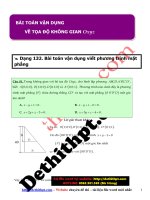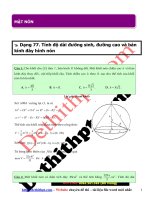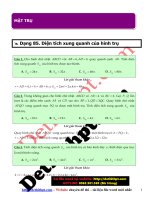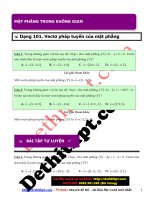48 câu viết lại câu nghĩa không đổi thầy đại lợi file word có lời giải chi tiết image marked image marked
Bạn đang xem bản rút gọn của tài liệu. Xem và tải ngay bản đầy đủ của tài liệu tại đây (294.89 KB, 15 trang )
Viết lại câu nghĩa không đổi
Question 1: No one has seen Linda since the day of the party.
A. Linda has not been seen since the day of the party.
B. Linda is nowhere to be seen at the party.
C. The party is going on without Linda.
D. No one has seen Linda for ages.
Question 2: He talked about nothing except the weather.
A. He talked about everything including weather.
B. His sole topic of conversation was the weather.
C. He had nothing to say about the weather.
D. He said he had no interest in the weather.
Question 3: He doesn’t study hard, so he can fail the exam.
A. If he studies hard, he won’t fail the exam.
B. If ha didn’t study hard, he wouldn’t fail the exam.
C. If he studied hard, he wouldn’t fail the exam.
D. If he hadn’t studied hard, he wouldn’t have failed the exam.
Question 4: The man wanted to get some fresh air in the room. He opened the window
A. The man wanted to get some fresh air in the room because he opened the window
B. The man opened the window in order to get some fresh air in the room
C. The man got some fresh air in the room, even though he opened the window
D. Having opened the window, the room could get some fresh air
Question 5: The plan may be ingenious. It will never work in practice.
A. Ingenious as it may be, the plan will never work in practice
B. Ingenious as may the plan, it will never work in practice
C. The plan may be too ingenious to work in practice
D. The plan is as impractical as it is ingenious.
Question 6: He was able to finish his book. It was because his wife helped him.
A. If only he had been able to finish his book.
B. If it weren’t for his wife’s help, he couldn’t have finished his book.
C. Without his wife’s help, he couldn’t have finished his book.
D. But for his wife’s help, he couldn’t finish his book.
Question 7: The basketball team knew they lost the match. They soon started to blame each
other.
A. Hardly had the basketball team known they lost the match when they started to blame each
other.
B. Not only did the basketball team lose the match but they blamed each other as well.
C. No sooner had the basketball team started to blame each other than they knew they lost the
match.
D. As soon as they blamed each other, the basketball team knew they lost the match.
Question 8: They believe a single gunman carried out the attack.
A. The attack’s is believed to have carried out a single gunman
B. A single gunman is believed to have carried out the attack
C. It is believed to be carried out the attack by a single gunman.
D. It is believed that the attack has been carried out by a single gunman.
Question 9: "I'm sorry. I didn’t do the homework." said the boy.
A. The boy admitted not doing the homework.
B. The boy said that he was sorry and he wouldn’t do the homework.
C. The boy denied not doing the homework.
D. The boy refused to do the homework.
Question 10: You can stay in the flat for free as long as you pay the bills.
A. Whether you pay the bills or stay in the flat, it is free.
B. Without the bills paid, you can stay in the free flat.
C. Unless the flat is free of bills, you cannot stay in it.
D. Provided you pay the bills, you can stay in the flat for free.
Question 11: I’m sure Luisa was very disappointed when she failed the exam.
A. Luisa must be very disappointed when she failed the exam.
B. Luisa must have been very disappointed when she failed the exam.
C. Luisa may be very disappointed when she failed the exam.
D. Luisa could have been very disappointed when she failed the exam.
Question 12: - “You had better see a doctor if the sore throat does not clear up,” she said to me.
A. She reminded me of seeing a doctor if the sore throat did not clear up.
B. She ordered me to see a doctor if the sore throat did not clear up.
C. She insisted that I see a doctor unless the sore throat did not clear up.
D. She suggested that I see a doctor if the sore throat did not clear up.
Question 13: Without her teacher’s advice, she would never have written such a good essay.
A. Her teacher advised him and she didn’t write a good essay.
B. Her teacher didn’t advise her and she didn’t write a good essay.
C. She wrote a good essay as her teacher gave her some advice.
D. If her teacher didn’t advise her, she wouldn’t write such a good essay.
Question 14: She tried very hard to pass the driving test. She could hardly pass it.
A. Although she didn’t try hard to pass the driving test, she could pass it.
B. Despite being able to pass the driving test, she didn’t pass it.
C. No matter how hard she tried, she could hardly pass the driving test.
D. She tried very hard, so she passed the driving test satisfactorily.
Question 15: We didn’t want to spend a lot of money. We stayed in a cheap hotel.
A. Rather than spending a lot of money, we stayed in a cheap hotel.
B. In spite of spending a lot of money, we stayed in a cheap hotel.
C. We stayed in a cheap hotel, but we had to spend a lot of money.
D. We didn’t stay in a cheap hotel as we had a lot of money to spend.
Question 16: Had the announcement been made earlier, more people wouls have attended the
lecture.
A. The lecture was held so late thet a few people attended it.
B. More people came late to the lecture because of the late announcement.
C. The late announcement helped make the lecture well- attended.
D. Few people came to the lecture because the announcement was not made earlier.
Question 17: She raised her hand high so that she could attract the teacher’s attention.
A. Because her teacher attracted her, she raised her hand again.
B. Though she raised her hand high, she couldn’t attract her teacher’s attention.
C. To attract her teacher’s attention, she raised her hand high.
D. She had such a high raising of hand that she failed to attract her teacher’s attention.
Question 18: Anyone who misses more than fifty percent of the classes deserves to fail.
A. Those who are absent more than half the time shouls fail.
B. Fifty percent of classes have failed the exams.
C. More than fifty percent is too much for one class.
D. People who fail must make up fifty percent of the classwork.
Question 19: The old man is workign in this factory. I borrowed his bicycle yesterday.
A. The old man is workign in this factory which I borrowed his bycicle yesterday.
B. The old man whom I borrowed his bicycle yesterday is working in this factory.
C. The old man whose bicycle I borrowed yesterday is working in this factory.
D. The old man whom is working in this factory I borrowed his bicycle yesterday.
Question 20: Mary doesn’t like sports. Her brother doesn’t, either.
A. Neither Mary or her brother likes sports.
B. either Mary or her brotehr loikes sports.
C.Neither Mary nor her brother likes sports.
D. both Mary and her brother like sports.
Question 21: “Leave my house now or I’ll call the police!” shouted the lady to the man.
A. The lady said she would call the police if the man didn’t leave her house.
B. The lady told the man that she would call the police he didn’t leave her house.
C. The lady informed the man that she would call the police if he didn’t leave her house.
D. The lady threatened to call the police if the man didn’t leave her house.
Question 22: He last has his eyes tested ten months ago.
A. He had tested his eyes ten months before.
B. He didn’t have any test on his eyes ten months before.
C. He had not tested his eyes for ten months then.
D. He hasn’t had his eyes tested for ten months.
Question 23: He survived the operation thanks to the skillful surgeon.
A. He survived because he was a skillful surgeon.
B. He wouldn’t have survived the operation without the skillful surgeon.
C. There was no skillful surgeon, so he died.
D. Though the surgeon was skillful, he couldn’t survive the operation.
Question 24: They were rich; they didn’t have a happy family, though.
A. Although they were rich, but they didn’t have a happy family.
B. Rich though they were, they didn’t have a happy family.
C. They were rich although they didn’t have a happy family.
D. However they were rich, they didn’t have a happy family.
Question 25: One student failed because he completely ignored the instruction on the paper. The
instructions appeared on the top of every page.
A. One student failed because he completely ignored the instructions appearing on the top of
every page on the paper.
B. Even though one student ignored the instructions printed on the top of every paper, he
failed.
C. One student failed to ignore the instructions printed on the top of every page of paper.
D. No matter how completely one student ignored the instructions printed on the top of every
page of the paper, he failed.
Question 26: The soccer team knew they lost the match. They soon started to blame each other.
A. Not only did the soccer team lose the match but they blamed each other as well
B. No sooner had the soccer team started to blame each other than they knew they lost the match.
C. As soon as they blamed each other, the soccer team knew they lost the match.
D. Hardly had the soccer team known they lost the match when they started to blame each other.
Question 27: Lucy always reminds me of my youngest sister.
A. My youngest sister’s name is Lucy.
B. I always think of Lucy, my youngest sister.
C. Whenever I see Lucy, I think of my youngest sister.
D. It is Lucy who is my youngest sister.
Question 28: They had such a fierce dog that nobody would visit them.
A. So fierce was their dog that nobody would visit them.
B. Their dog was fierce enough for anybody to visit them.
C. If their dog weren’t fierce, somebody would visit them.
D. So fierce a dog did they had that nobody would visit them.
Question 29: They are my two sisters. They aren’t teachers like me.
A. They are my two sisters, that are teachers like me.
B. They are my two sisters, neither of whom are teachers like me.
C. They are my two sisters, both of those are teachers like me.
D. Unlike me, neither of my two sisters aren’t teachers.
Question 30: “Why don’t you participate in the volunteer work in summer?" said Sophie.
A. Sophie suggested my participating in the volunteer work in summer.
B. Sophie made me participate in the volunteer work in summer.
C. Sophie asked me why not participate in the volunteer work in summer.
D. Sophie suggested me to participate in the volunteer work in summer.
Question 31: Impressed as we were by the new cinema, we found it rather expensive.
A. The new cinema was more expensive than we expected.
B. The new cinema impressed us because it was rather expensive.
C. We were very impressed by the new cinema, but we found it rather expensive.
D. We were not impressed by the new cinema at all because it looked rather expensive.
Question 32: “You should have finished the report by now,” John told his secretary.
A. John reproached his secretary for not having finished the report.
B. John said that his secretary had not finished the report.
C. John reminded his secretary of finishing the report on time.
D. John scolded to his secretary for not having finished the report.
Question 33: When I picked up my book I found that the cover had been torn.
A. Picking up my book, the cover had been torn.
B. On picking up the book, I saw that the cover had been torn.
C. Picked up, I saw that the cover of the book was torn.
D. The cover had been torn when my book picked up.
Question 34: “Make good use of your time. You won’t get such an opportunity again” said he to
me.
A. He let me make use of my time because I wouldn’t get an opportunity again.
B. He advised me to make use of my time as I wouldn’t get an opportunity again.
C. He ordered me to make use of my time saying that I wouldn’t get an opportunity again
D. He offered me such an opportunity so that I could make good use of my time.
Question 35: Her living conditions were difficult. However, she studied very well.
A. Although she lived in difficult conditions, but she studied very well.
B. She studied very well thanks to the fact that she lived in difficult conditions.
C. Difficult as her living conditions, she studied very well.
D. She studied very well in spite of her difficult living conditions.
Question 36: The situation was so embarrassing that she did not know what to do.
A. So embarrassing was the situation that she did not know what to do.
B. It was such an embarrassing situation; however, she did not know what to do.
C. So embarrassing the situation was that she did not know what to do.
D. She did not know what to do, though it was not an embarrassing situation.
Question 37: It is expected that tax increases will be announced in tomorrow’s budget statement.
A. Tax increases are expected to be announced in tomorrow’s budget statement.
B. It is expected that people will announce in tomorrow budget tax increases.
C. In tomorrow’s budget statement tax increases are expected to announce.
D. Hope that they will announce tax increases in tomorrow’s budget statement.
Question 38: Fiona has been typing the report for an hour.
A. It took Fiona an hour to type the report.
B. It is an hour since Fiona started typing the report.
C. Fiona finished the report an hour ago.
D. Fiona will finish typing the report in an hour.
Question 39: I can’t do the test because it is too difficult.
A. If the test isn’t too difficult, I can do it.
B. If the test weren’t too difficult, I could do it.
C. If the test weren’t too difficult, I can do it.
D. If the test hadn’t been too difficult, I could do it.
Question 40: The children couldn't go swimming because the sea was too rough.
A. The sea was too rough for the children to go swimming.
B. The sea was rough enough for the children to swim in.
C. The sea was too rough to the children's swimming.
D. The children were not calm enough to swim in the sea.
Question 41: However old and worn his clothes were, they look clean and of good quality.
A. His clothes looked clean and of good quality but they were old and worn.
B. His clothes, though old and worn, looked clean and of good quality.
C. He was fond of wearing such old and worn clothes because they were of good quality.
D. No matter what good quality his clothes had, they looked old and worn.
Question 42: In spite of his poverty, he led a devoted life to the revolutionary cause.
A. He could not devote his life to the revolutionary cause because of his poverty.
B. If he had not been so poor, he could have devoted his life to the revolutionary cause.
C. Poor as he was, he led a devoted life to the revolutionary cause.
D. He led a devoted life to the revolutionary cause, but he was so poor.
Question 43: I thought I should not stay at home yesterday.
A. I regretted staying at home yesterday.
B. I regretted for staying at home yesterday.
C. I regret for staying at home yesterday.
D. I regret to stay at home yesterday.
Question 44: People should not throw rubbish in the park. People should not cut down the trees
in the park.
A. People should either throw rubbish in the park or cut down the trees in the park.
B. People should neither throw rubbish nor cut down the trees in the park.
C. People should either throw rubbish nor cut down the trees in the park.
D. People should neither throw rubbish or cut down the trees in the park
Question 45: Most of the classmates couldn't come. He invited them to the birthday party.
A. Most of the classmates he invited to the birthday party couldn't come.
B. Most of the classmates he was invited to the birthday party couldn't come.
C. Most of the classmates that he invited them to the birthday party couldn't come.
D. Most of the classmates which he invited to the birthday party couldn't come.
Question 46: It is not until the sun is shining brightly that the little girl woke up.
A. No sooner is the sun shining brightly than the little girl woke up.
B. Not until the little girl woke up is the sun shining brightly.
C. Not until the sun is shining brightly did the little girl wake up.
D. As soon as the little girl woke up, the sun hasn’t shone brightly yet.
Question 47: "What language do you find the most difficult to learn of all?" Nhung asked Ha.
A. Nhung asked Ha what language Ha found the most difficult to learn of all.
B. Nhung wanted to know what language they founded the most difficult to learn of all.
C. Nhung asked Ha what language did you find the most difficult to learn of all.
D. Nhung asked Ha what language you found the most difficult to learn of all.
Question 48: They reported that the teachers expected more.
A. The teachers were reported to have been expected of more.
B. The teachers were expected more.
C. The teachers were reported to have expected more.
D. The teachers were reported to expect more.
Question 1: Đáp án A
Đây là một câu chuyển từ dạng chủ động sang bị động
Không ai nhìn thấy Linda kể từ bữa tiệc = Linda không được nhìn thấy/không được tìm thấy kể
từ bữa tiệc
Question 2: Đáp án B
Anh ta không nói về cái gì khác ngoài thời tiết = Chủ đề duy nhất khi đối thoại của anh ta là thời
tiết
Question 3: Đáp án A
Câu gốc được dùng ở thì hiện tại, diễn tả một hành động có khả năng xảy ra trong tương lai.
Cho nên phải dùng câu điều kiện loại 1: Nếu anh ta học chăm chỉ, anh ta sẽ không trượt kì thi
Question 4: Đáp án B
Người đàn ông muốn có chút không khí trong lành vào trong phòng. Ông đã mở cửa sổ.
= Người đàn ông đã mở cửa sổ để đưa không khí trong lành vào trong phòng
Question 5: Đáp án A
Kế hoạch này có thể rất khéo léo. Nó sẽ không bao giờ hoạt động trong thực tế.
= Dù rất hay, kế hoạch này sẽ không bao giờ hoạt động trong thực tế
Question 6: Đáp án C
Anh ấy có thể tìm được quyển sách vì vợ anh ấy giúp anh ấy.
→ Câu điều kiện loại 3: Nếu không có sự giúp đỡ của vợ, anh ấy không thể tìm được quyển sách.
Question 7: Đáp án A
Đội bóng rổ thua trận đấu. Họ bắt đầu đổ lỗi cho nhau.
→ Cấu trúc Hardly had S+ Ved when S+ quá khứ đơn: Ngay khi đội bóng rổ biết rằng họ thua
trận đấu họ bắt đầu đổ lỗi cho nhau.
Question 8: Đáp án B
Họ tin rằng người đàn ông mang theo súng đã tiến hành cuộc tấn công.
→ Câu bị động: Người đàn ông một mình mang theo súng được tin rằng đã gây ra cuộc tấn công.
Question 9: Đáp án A
Thằng bé nói: Em xin lỗi. Em đã không làm bài tập về nhà.
→ Cấu trúc: S admit Ving → Thằng bé thừa nhận đã không làm bài tập về nhà.
Question 10: Đáp án D
Ông có thể ở trong ngôi nhà này thoải mái nếu ông trả tất cả hóa đơn.
= Nếu ông trả hết những hóa đơn này, ông có thể ở trong ngôi nhà này thoải mái.
Question 11: Đáp án B
Tôi chắc rằng Luisa đã rất thất vọng khi cô ấy thi trượt.
Tình huống dự đoán trong quá khứ nên dùng must have Ved/ V3
Question 12: Đáp án D
Bạn nên gặp bác sĩ nếu vẫn chưa hết đau họng → Cô ấy đề nghị tôi
Question 13: Đáp án C
Không có lời khuyên của thầy cô ấy sẽ không bao giờ viết được bài văn hay như vậy
→ Cô ấy đã viết bài văn hay nhờ vào lời khuyên của thầy.
Question 14: Đáp án C
Cô ấy cô gắng rất nhiều để vượt qua kỳ thi bằng lái xe, nhưng cô ấy không thể.
Question 15: Đáp án A
Chúng tôi không muốn tiêu nhiều tiền vì vậy chúng tôi ở khách sạn rẻ tiền. → Thay vì tiêu nhiều
tiền chúng tôi ở khách sạn rẻ tiền.
Question 16: Đáp án D
Nếu thông báo được truyền đi sớm hơn, sẽ có nhiều người hơn tham gia vào buổi diễn thuyết. =
Rất ít người đến buổi diễn thuyết vì thông báo không được truyền đi sớm hơn.
Question 17: Đáp án C
Cô ấy giơ tay lên cao để thu hút sự chú ý của giáo viên = Để thu hút sự chú ý của giáo viên cô ấy
giơ tay lên cao.
Question 18: Đáp án A
Bất cứ ai nghỉ hơn 50% số buổi học sẽ bị trượt = Những người nghỉ hơn 50% thời gian sẽ trượt.
Question 19: Đáp án C
Ông cụ này làm việc trong nhà máy. Tôi đã mượn xe đạp của ông vào hôm qua.
Dùng đại từ quan hệ whose để nối 2 câu lại với nhau.
Question 20: Đáp án C
Mary không thích thể thao. Anh trai cô ấy cũng không. = Không Mary cũng không phải anh trai
cô ấy thích thể thao.
Neither…nor…: Không …cũng không…
Question 21: Đáp án D
– Người phụ nữ đe dọa người đàn ông sẽ gọi cảnh sát nếu ông ta không chịu rời căn nhà.
Question 22: Đáp án D
– Lần cuối cùng anh ấy kiểm tra mắt là 10 tháng trước => Anh ấy chưa hề kiểm tra mắt trong 10
tháng qua.
Question 23: Đáp án B
– Anh ấy đã sống sót qua cuộc phẫu thuật nhờ bác sĩ phẫu thuật lành nghề => Anh ấy lẽ ra đã
không sống sót qua cuộc phẫu thuật nếu không có bác sĩ phẫu thuật lành nghề.
Question 24: Đáp án B
– Cấu trúc Adj/Adv + As/Though +S +V chỉ sự nhượng bộ, bất chấp. (Dù họ có giàu, họ vẫn
không có được một gia đình hạnh phúc.)
Question 25: Đáp án A
– Một học sinh đã trượt vì anh ta hoàn toàn bỏ qua hướng dẫn được viết ở đầu trang giấy.
Question 26: Đáp án D
Đội bóng biết họ thua trận đấu. Họ bắt đầu đổ lỗi cho nhau.
Cấu trúc: Hardly had +S+ Ved/V3 when S+ Ved/V2: ngay sau khi…thì
Question 27: Đáp án C
Lucy luôn gợi cho tôi nhớ về em gái nhỏ. = Bất cứ lúc nào nhìn thấy Lucy tôi cũng nghĩ ngay
đến em gái nhỏ của mình.
Question 28: Đáp án A
Họ có chú chó hung dữ đến nỗi mà không ai dám đến nhà họ chơi.
Cấu trúc: S+ V+ such + cụm dnah từ that S+ V = So + adj + be + S+ that S+ V: quá…đến nỗi mà
Question 29: Đáp án B
Họ là hai chị gái của tôi. Họ không làm giáo viên giống như tôi.= Họ là hai người chị gái của tôi,
không ai trong số họ làm giáo viên giống như tôi.
Question 30: Đáp án A
Sophie nói: “ Tại sao bạn không tham gia vào công tác tình nguyện mùa hè này nhỉ?” = Sophie
đề nghị tôi tham gia vào công tác tình nguyện mùa hè này.
Question 31: Đáp án C
Impressed as we were by the new cinema, we found it rather expensive.
Ấn tượng về bộ phim, nhưng chúng tôi cảm thấy nó khá là đắt
= We were very impressed by the new cinema, but we found it rather expensive.
Chúng tôi rất ấn tượng về bộ phim, nhưng cảm thấy nó khá là đắt
Question 32: Đáp án A
“You should have finished the report by now,” John told his secretary.
“Cô đã nên hoàn thành bản báo cáo vào lúc này rồi chứ” John nói với thư ký
= John reproached his secretary for not having finished the report.
John trách thư ký vì chưa hoàn thành bản báo cáo
Question 33: Đáp án B
When I picked up my book I found that the cover had been torn.
Khi cầm sách lên tôi phát hiện trang bìa đã bị rách.
= On picking up the book, I saw that the cover had been torn.
Cầm sách lên, tôi thấy trang bìa đã bị rách (On picking up the book = When picked up the book)
Question 34: Đáp án B
“Make good use of your time. You won‟t get such an opportunity again” said he to me.
“Sử dụng thời gian hợp lý. Bạn sẽ không có cơ hội như thế này lần nữa đâu” => đây là một lời
khuyên => sử dụng động từ advise
To advise sb to do st: khuyên ai đó nên làm gì
Question 35: Đáp án D
Her living conditions were difficult. However, she studied very well.
Hoàn cảnh sống của cô ấy rất khó khăn. Tuy nhiên, cô ấy học rất giỏi
= Difficult as her living conditions, she studied very well.
Hoàn cảnh khó khăn như vậy, nhưng cô ấy vẫn học giỏi
(đảo tính từ lên trước nhằm nhấn mạnh tính chất, đặc điểm của danh từ)
Question 36. Đáp án A
Tình huống quá bối rối đến nỗi mà cô ấy không biết làm gì.
Cấu trúc: S+be+ so + tính từ+ that S+V = So tính từ be S that S+V => quá…đến nỗi mà
Question 37. Đáp án A
Nó được kỳ vọng rằng tăng thuế sẽ được thông báo trong báo cáo ngân sách ngày mai. => câu bị
động: Việc tăng thuế được kỳ vọng sẽ được thông báo trong báo cáo ngân sách ngày mai.
Question 38. Đáp án B
Fiona đã gõ báo cáo này khoảng 1 giờ đồng hồ. = Nó đã được gần 1 giờ đồng hồ kể từ khi
Fiona bắt đầu gõ báo cáo này.
Question 39. Đáp án B
Tôi không thể làm bài kiểm tra vì nó quá khó. => Câu điều kiện loại 2 : if S+ quá khứ đơn, S+
would Vo
Question 40. Đáp án A
Trẻ con không thể đi bơi vì biển xấu = Biển quá xấu cho trẻ con đi bơi => Cấu trúc: too…to
Vo: quá…để làm cái gì
Question 41. Đáp án B
However old and worn his clothes were, they look clean and of good quality.
Quần áo anh ta dù cũ và sờn thế nào, nhưng trông chúng sạch và chất lượng tốt
= His clothes, though old and worn, looked clean and of good quality.
Quần áo anh ta, dù cũ và sờn, trông sạch và chất lượng tốt
Question 42. Đáp án C
In spite of his poverty, he led a devoted life to the revolutionary cause.
Mặc dù nghèo, ông dẫn đầu một cuộc sống cống hiến cho sự nghiệp cách mạng.
= Poor as he was, he led a devoted life to the revolutionary cause.
Nghèo như vậy, nhưng ông dẫn đầu một cuộc sống cống hiến cho sự nghiệp cách mạng.
Question 43. Đáp án A
I thought I should not stay at home yesterday.
Tôi nghĩ tôi không nên ở nhà hôm qua
= I regretted staying at home yesterday.
Tôi hối tiếc đã ở nhà hôm qua
Regret + Ving: hối hận, hối tiếc làm gì
Question 44. Đáp án B
Cần phân biệt giữa “either ..or” và “neither…nor”
Do đó đáp án C, D loại
“in the park” là trạng từ chỉ địa điểm chung cho 2 hành động, bởi vậy chỉ cần nhắc đến một lần.
Đáp án là B: Chúng ta không nên vứt rác hay chặt cây trong công viên
Question 45. Đáp án A
Most of the classmates couldn't come. He invited them to the birthday party.
Hầu hết các bạn cùng lớp không thể đến. Cậu ấy đã mời họ đến tiệc sinh nhật
= Most of the classmates he invited to the birthday party couldn't come.
Hầu hết các bạn cùng lớp cậu ấy đã mời đến tiệc sinh nhật đều không thể đến
Ở đây khuyết mệnh đề quan hệ who, tuy nhiên vẫn đúng ngữ pháp và nghĩa của câu.
Question 46: Đáp án C
Mãi đến khi mặt trời nắng chói chang bé con mới thức dậy.
It is not until S+ V that S+ quá khứ đơn = Not until + V+ S that S+V
Question 47: Đáp án A
Nhung hỏi Hà ngôn ngữ nào bạn thấy khó học nhất.
Câu tường thuật nên đổi ngôi lùi thì và không đảo ngữ.
Question 48: Đáp án D
Họ báo cáo rằng các giáo viên đã mong đợi nhiều hơn. => Câu bị động
S+ be +Ved + to Vo









